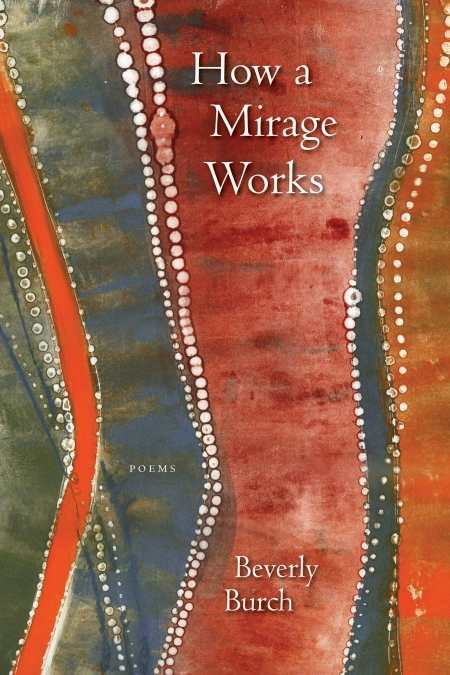How a Mirage Works
Acting as both the asker and the one giving herself answers, poet Beverly Burch imbues self-wisdom into her words through vivid detail.
With her second collection of poetry, award-winning Beverly Burch offers a rich and compelling view of the world alongside startlingly personal moments.
Standout narrative pieces like “Paterfamilias” and “Midnight Reunion” ache with a grief that lays plain the speaker’s desire for connection. In fact, desire is everywhere here—in moments where a kiss feels like “a shot of rapture, // like being played on, firefly against glass”; in moments where the belongings of a loved one who has passed on give “off heat— / even the tables and chairs / bright with residue.” It is a desire that exposes the poet’s own tenderness even as it challenges us to open to the rawness of our own most intimate experiences.
Images gorgeous in their redolence are expertly rendered through Burch’s attention to detail: “Creatures in the grass, / between floorboards, batting at the screen door. / The lush humidity of mothers, fathers. / Stringed legs and bowed wings // chant the short-lived life.” The weight of the past, of places lived, of loves that were, is expressed in language that translates heaviness into life: “sun sifts in, words drift out, stream and eddy.”
The poetry itself looks beautiful on the page. Attention to line breaks and white space draws us in and speaks to Burch’s interest in writing poems that engage both visually and intellectually. Thought-provoking pieces that play with repetition and meter demonstrate the poet’s range, like “Aubade with Frankenstein” and “Suburban Goddess,” which seem to transcend the personal while they simultaneously scrape at important truths about human interaction.
The “Final Exam” poems (intertwined throughout) offer a unique element to the collection. With them, the poet seems to be both the asker and the one who answers, creating an interesting tension and adding a layer of judgment. But the answers, the poems themselves, suggest an effortless brilliance captured in explanations that both cut and coalesce in their incisiveness. It is perhaps through this very act of asking and answering herself that Burch teaches us: that in our desire to understand our sorrows and loves both tiny and great, we have within us the ability to respond to life deftly, simply by living: “Sometimes, imagination careens / like a sparrow in a darkened room. / It gets things wrong— / still, when the first blade of light enters, // though it’s a pain to rouse, you get back on / the job, summoning the world into place.”
Reviewed by
Margaret Fedder
Disclosure: This article is not an endorsement, but a review. The publisher of this book provided free copies of the book to have their book reviewed by a professional reviewer. No fee was paid by the publisher for this review. Foreword Reviews only recommends books that we love. Foreword Magazine, Inc. is disclosing this in accordance with the Federal Trade Commission’s 16 CFR, Part 255.

